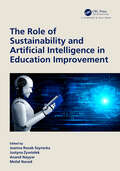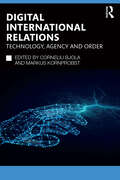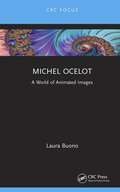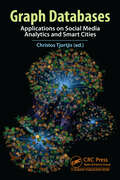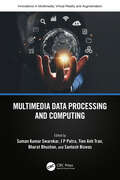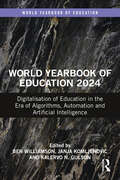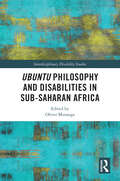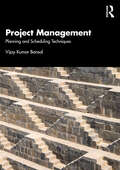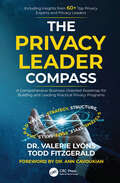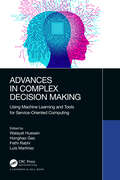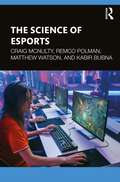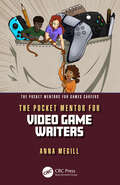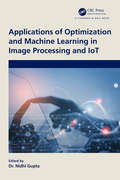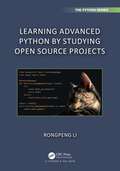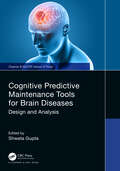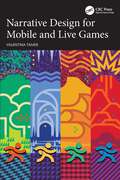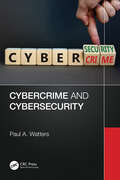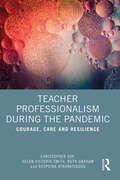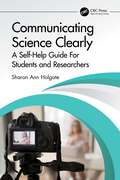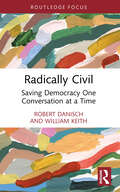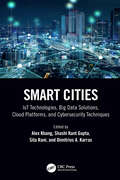- Table View
- List View
The Role of Sustainability and Artificial Intelligence in Education Improvement
by Anand Nayyar Mohd Naved Justyna Żywiołek Joanna Rosak-SzyrockaThis book is devoted to the issues faced by universities in the field of distance learning during and after COVID, as well as in digitalization times. The book devotes a lot of space to the issues of Web 3.0 in university e-learning, Industry 4.0, artificial intelligence and digital equity. The aim and scope of this book is to draw a holistic picture of education before and after COVID, the psychological effects of COVID in education, and using modern technologies application in education, taking into consideration aspects of sustainability development, Industry 4.0 and Society 5.0. The authors also raise the issue of artificial intelligence investigation in learner-instructor interaction. Features: • To elaborate the functions of online education and numerous pedagogical strategies based on electronic learning to aid teachers and students with the tools required to succeed in the 21st century via engaging virtual experiences• To analyze tools provided by Ed-Tech firms and the effect of digital tools on maintaining the educational process in times of crisis and after pandemic• To create a roadmap for higher education institutions and provide tips regarding how to improve the effectiveness of the hybrid learning system• To understand e-learning characteristic in the era of Industry 4.0 and Society 5.0 and characteristics of the different web generations• To use AI applications to improve connections and relationships between students and teachers and in education in the future The book is both scientific and educational. It can be used at the university level and by anyone interested in the topics it covers.
Digital International Relations: Technology, Agency and Order (Routledge Studies in Conflict, Security and Technology)
by Corneliu Bjola Markus KornprobstThis book analyses how digital transformation disrupts established patterns of world politics, moving International Relations (IR) increasingly towards Digital International Relations. This volume examines technological, agential and ordering processes that explain this fundamental change. The contributors trace how digital disruption changes the international world we live in, ranging from security to economics, from human rights advocacy to deep fakes, and from diplomacy to international law. The book makes two sets of contributions. First, it shows that the ongoing digital revolution profoundly changes every major dimension of international politics. Second, focusing on the interplay of technology, agency and order, it provides a framework for explaining these changes. The book also provides a map for adjusting the study of international politics to studying International Relations, making a case for upgrading, augmenting and rewiring the discipline. Theory follows practice in International Relations, but if the discipline wants to be able to meaningfully analyse the present and come up with plausible scenarios for the future, it must not lag too far behind major transformations of the world that it studies. This book facilitates that theoretical journey. This book will be of much interest to students of cyber-politics, politics and technology, and International Relations.
Advanced Mathematical Techniques in Computational and Intelligent Systems (Computational and Intelligent Systems)
by Aliakbar Montazer Haghighi Sandeep Singh Sandeep DalalThis book comprehensively discusses the modeling of real-world industrial problems and innovative optimization techniques such as heuristics, finite methods, operation research techniques, intelligent algorithms, and agent- based methods. Discusses advanced techniques such as key cell, Mobius inversion, and zero suffix techniques to find initial feasible solutions to optimization problems. Provides a useful guide toward the development of a sustainable model for disaster management. Presents optimized hybrid block method techniques to solve mathematical problems existing in the industries. Covers mathematical techniques such as Laplace transformation, stochastic process, and differential techniques related to reliability theory. Highlights application on smart agriculture, smart healthcare, techniques for disaster management, and smart manufacturing. Advanced Mathematical Techniques in Computational and Intelligent Systems is primarily written for graduate and senior undergraduate students, as well as academic researchers in electrical engineering, electronics and communications engineering, computer engineering, and mathematics.
Custom Components in Architecture: Strategies for Customizing Repetitive Manufacturing
by Dana GullingThis book offers architects strategies in the design and manufacturing of custom, repetitively manufactured building components.A total of 36 case studies from around the globe demonstrate the diversity of CRM in architecture and are contributed by architecture firms, including Diller Scofidio + Renfro, Kengo Kuma & Associates, Abin Design Studio, Behnisch Architekten, Belzberg Architects, and many more. The book is organized by manufacturing process and covers the use of various types of glass, clay, plastic, metal, wood, plaster, and concrete. Each process is described with diagrams and text and expanded with one or more examples of customized building components. Projects included are of buildings of various types, sizes, and clients, and many deviate from the typical manufacturing process as they include a secondary process (e.g. casting glass, then slumping it), special tooling modifications (e.g. dams used to subdivide a mold), post-production processes, or other notable manufacturing features. Each case study includes a project overview, behind‐the‐scenes images of the component manufacturing, and original diagrams that illustrate how those components were customized.Custom Components in Architecture will be essential reading for any architect interested in building design details and keeping up-to-speed on material advances. Upper-level students of digital architecture, fabrication, and building technology will also find this a useful tool.
Michel Ocelot: A World of Animated Images
by Laura BuonoThis unique book examines the career of Michel Ocelot, from his earliest works to his latest research and productions, including an interview regarding his latest film Le Pharaon, le Sauvage et la Princesse (2022). The book highlights the director’s role in the panorama of contemporary animated cinema and his relationship with the tradition, both artistic and cinematographic. The book carefully analyses the ethical and social nature of Ocelot’s work to underscore the duality of the director’s oeuvre, both artistic and social, using an interdisciplinary approach that blends film and aesthetic criticism with gender studies and decolonial thought. Particular attention will be given to the themes of multiculturalism, discrimination, and treatment of women, which are at the centre of many current cultural debates. The book will be of interest to an audience of experts, animation enthusiasts, and film scholars, as well as to a wider readership interested in learning about the poetics of Kirikou’s father.
Graph Databases: Applications on Social Media Analytics and Smart Cities
by Christos TjortjisWith social media producing such huge amounts of data, the importance of gathering this rich data, often called "the digital gold rush", processing it and retrieving information is vital. This practical book combines various state-of-the-art tools, technologies and techniques to help us understand Social Media Analytics, Data Mining and Graph Databases, and how to better utilize their potential. Graph Databases: Applications on Social Media Analytics and Smart Cities reviews social media analytics with examples using real-world data. It describes data mining tools for optimal information retrieval; how to crawl and mine data from Twitter; and the advantages of Graph Databases. The book is meant for students, academicians, developers and simple general users involved with Data Science and Graph Databases to understand the notions, concepts, techniques, and tools necessary to extract data from social media, which will aid in better information retrieval, management and prediction.
Multimedia Data Processing and Computing (Innovations in Multimedia, Virtual Reality and Augmentation)
by Bharat Bhushan Tien Anh Tran Suman Kumar Swarnkar J P Patra Santosh BiswasThis book focuses on different applications of multimedia with supervised and unsupervised data engineering in the modern world. It includes AI-based soft computing and machine techniques in the field of medical diagnosis, biometrics, networking, manufacturing, data science, automation in electronics industries, and many more relevant fields. Multimedia Data Processing and Computing provides a complete introduction to machine learning concepts, as well as practical guidance on how to use machine learning tools and techniques in real-world data engineering situations. It is divided into three sections. In this book on multimedia data engineering and machine learning, the reader will learn how to prepare inputs, interpret outputs, appraise discoveries, and employ algorithmic strategies that are at the heart of successful data mining. The chapters focus on the use of various machine learning algorithms, neural net- work algorithms, evolutionary techniques, fuzzy logic techniques, and deep learning techniques through projects, so that the reader can easily understand not only the concept of different algorithms but also the real-world implementation of the algorithms using IoT devices. The authors bring together concepts, ideas, paradigms, tools, methodologies, and strategies that span both supervised and unsupervised engineering, with a particular emphasis on multimedia data engineering. The authors also emphasize the need for developing a foundation of machine learning expertise in order to deal with a variety of real-world case studies in a variety of sectors such as biological communication systems, healthcare, security, finance, and economics, among others. Finally, the book also presents real-world case studies from machine learning ecosystems to demonstrate the necessary machine learning skills to become a successful practitioner. The primary users for the book include undergraduate and postgraduate students, researchers, academicians, specialists, and practitioners in computer science and engineering.
Artificial Intelligence and Machine Learning in the Thermal Spray Industry: Practices, Implementation, and Challenges (Multi-Scale and Multi-Functional Materials)
by Lalit Thakur Hitesh Vasudev Jashanpreet Singh Gaurav PrasharThis book details the emerging area of the induction of expert systems in thermal spray technology, replacing traditional parametric optimization methods like numerical modeling and simulation. It promotes, enlightens, and hastens the digital transformation of the surface engineering industry by discussing the contribution of expert systems like Machine Learning (ML) and Artificial Intelligence (AI) toward achieving durable Thermal Spray (TS) coatings. Artificial Intelligence and Machine Learning in the Thermal Spray Industry: Practices, Implementation, and Challenges highlights how AI and ML techniques are used in the TS industry. It sheds light on AI’s versatility, revealing its applicability in solving problems related to conventional simulation and numeric modeling techniques. This book combines automated technologies with expert machines to show several advantages, including decreased error and greater accuracy in judgment, and prediction, enhanced efficiency, reduced time consumption, and lower costs. Specific barriers preventing AI’s successful implementation in the TS industry are also discussed. This book also looks at how training and validating more models with microstructural features of deposited coating will be the center point to grooming this technology in the future. Lastly, this book thoroughly analyzes the digital technologies available for modeling and achieving high-performance coatings, including giving AI-related models like Artificial Neural Networks (ANN) and Convolutional Neural Networks (CNN) more attention. This reference book is directed toward professors, students, practitioners, and researchers of higher education institutions working in the fields that deal with the application of AI and ML technology.
World Yearbook of Education 2024: Digitalisation of Education in the Era of Algorithms, Automation and Artificial Intelligence (World Yearbook of Education)
by Kalervo N. Gulson Ben Williamson Janja KomljenovicProviding a comprehensive, global overview of the digitalisation of education, the World Yearbook of Education 2024 examines the ways advanced digital technologies are transforming educational practices, institutions and policy processes.Establishing a critical research agenda for analysing the digitalisation of education, the carefully selected chapters in this collection interrogate the current impacts of new digital technologies, emerging controversies over emerging data practices and future implications of algorithmic systems, automated decision-making and AI in education. Organised into four sections, the contributions in the collection examine the following: The historical, scientific and technical foundations of contemporary digitalisation in education The political and economic dynamics that underpin the education technology industry and new platform models of education How algorithms, automation and AI support new modes of data-driven governance and control of education systems Controversies over the inequitable effects of digitalisation in education, and proposals for data justice, ethics and regulation This resource is ideal reading for researchers, students, educational practitioners and policy officials interested in understanding the future of digital technologies in education.
Ubuntu Philosophy and Disabilities in Sub-Saharan Africa (Interdisciplinary Disability Studies)
by Oliver MutangaThis book uses Ubuntu philosophy to illuminate the voices of people with disabilities from Sub-Saharan Africa. Disability literature is largely dominated by scholars and studies from the Global North, and these studies are largely informed by Global North theories and concepts. Although disability literature in the Global South is now fast growing, most studies continue to utilise conceptual, theoretical, and philosophical frameworks that are framed within Global North contexts. This presents two major challenges: Firstly, the voices of people with disabilities in the Global South remain on the fringes of disability discourses. Secondly, when their voices are heard, their realities are distorted. This edited book, consisting of 11 chapters, provides case studies from Botswana, Ghana, Lesotho, Uganda, and South Africa, explores disability in various fields: Inclusive education, higher education, environment, Open Distance Learning, and Technical and Vocational Education and Technical Colleges. The book contributes to the ways in which disability is understood and experienced in the Global South thereby challenging the Western hegemonic discourses on disability. This collection of contributions will be of interest to all scholars and students of disability studies, development studies, medical sociology, and African studies.
Low Power Designs in Nanodevices and Circuits for Emerging Applications
by P. Sivakumar Shilpi Birla Neha Singh Shashi Kant DargarThis reference textbook discusses low power designs for emerging applications. This book focuses on the research challenges associated with theory, design, and applications towards emerging Microelectronics and VLSI device design and developments, about low power consumptions. The advancements in large-scale integration technologies are principally responsible for the growth of the electronics industry. This book is focused on senior undergraduates, graduate students, and professionals in the field of electrical and electronics engineering, nanotechnology. This book: • Discusses various low power techniques and applications for designing efficient circuits. • Covers advance nanodevices such as FinFETs, TFETs, CNTFETs. • Covers various emerging areas like Quantum-Dot Cellular Automata Circuits and FPGAs and sensors. • Discusses applications like memory design for low power applications using nanodevices. The number of options for ICs in control applications, telecommunications, high-performance computing, and consumer electronics continues to grow with the emergence of VLSI designs. Nanodevices have revolutionized the electronics market and human life; it has impacted individual life to make it more convenient. They are ruling every sector such as electronics, energy, biomedicine, food, environment, and communication. This book discusses various emerging low power applications using CMOS and other emerging nanodevices.
Project Management: Planning and Scheduling Techniques
by Vijay Kumar BansalProject Management:Planning and Scheduling Techniques is a highly readable guide to the essentials of project planning, scheduling, and control aimed at readers looking for an introduction to the core concepts of planning and scheduling, including the ‘Critical Path Method’, but also the ‘Precedence Diagramming Method’, the ‘Line of Balance’ technique, and the ‘Programme Evaluation and Review Technique’. This book explains the theory behind the methods and makes effective use of learning outcomes, exercises, diagrams, and examples to provide clear and actionable knowledge for students and project managers. The book can be used as a classroom textbook or as a self-study guide for project managers taking their professional qualifications, and it includes examples from a wide range of project management scenarios. It is suitable for planning and scheduling courses in the fields of industrial, civil, and mechanical engineering, construction, and management.
The Privacy Leader Compass: A Comprehensive Business-Oriented Roadmap for Building and Leading Practical Privacy Programs
by Todd Fitzgerald Valerie LyonsCongratulations! Perhaps you have been appointed as the Chief Privacy Officer (CPO) or the Data Protection Officer (DPO) for your company. Or maybe you are an experienced CPO/DPO, and you wonder – "what can I learn from other successful privacy experts to be even more effective?" Or perhaps you are considering a move from a different career path and deciding if this is the right direction for you. Seasoned award-winning Privacy and Cybersecurity leaders Dr. Valerie Lyons (Dublin, Ireland) and Todd Fitzgerald (Chicago, IL USA) have teamed up with over 60 award-winning CPOs, DPOs, highly respected privacy/data protection leaders, data protection authorities, and privacy standard setters who have fought the tough battle. Just as the #1 best-selling and CANON Cybersecurity Hall of Fame winning CISO Compass: Navigating Cybersecurity Leadership Challenges with Insights from Pioneers book provided actionable advice to Chief Information Security Officers, The Privacy Leader Compass is about straight talk – delivering a comprehensive privacy roadmap applied to, and organized by, a time-tested organizational effectiveness model (the McKinsey 7-S Framework) with practical, insightful stories and lessons learned. You own your continued success as a privacy leader. If you want a roadmap to build, lead, and sustain a program respected and supported by your board, management, organization, and peers, this book is for you.
Advances in Complex Decision Making: Using Machine Learning and Tools for Service-Oriented Computing
by Luis Martínez Honghao Gao Walayat Hussain Fethi RabhiThe rapidly evolving business and technology landscape demands sophisticated decision-making tools to stay ahead of the curve. Advances in Complex Decision Making: Using Machine Learning and Tools for Service-Oriented Computing is a cutting-edge technical guide exploring the latest decision-making technology advancements. This book provides a comprehensive overview of machine learning algorithms and examines their applications in complex decision-making systems in a service-oriented framework. The authors also delve into service-oriented computing and how it can be used to build complex systems that support decision making. Many real-world examples are discussed in this book to provide a practical insight into how discussed techniques can be applied in various domains, including distributed computing, cloud computing, IoT and other online platforms. For researchers, students, data scientists and technical practitioners, this book offers a deep dive into the current developments of machine learning algorithms and their applications in service-oriented computing. This book discusses various topics, including Fuzzy Decisions, ELICIT, OWA aggregation, Directed Acyclic Graph, RNN, LSTM, GRU, Type-2 Fuzzy Decision, Evidential Reasoning algorithm and robust optimisation algorithms. This book is essential for anyone interested in the intersection of machine learning and service computing in complex decision-making systems.
The Science of Esports
by Matthew Watson Craig McNulty Remco Polman Kabir BubnaThe Science of Esports draws from contemporary research and coach expertise to examine esports athlete health and performance from a range of disciplinary perspectives, including physiology, psychology, sociology, and nutrition. The rapid expansion of the esports industry has elevated competitive video gaming into the realm of high performance, requiring players, coaches, and practitioners to implement interdisciplinary approaches to performance support. The book covers key topic areas such as: What esports is and similarities and differences to sport Game-specific training Physiological and psychological consideration for esports athletes Social aspects of player performance and the social environment of esports Esports coaching and structure of esports performance environments Technology and its use in esports Safeguarding, cheating, and gambling This book includes worked examples and case studies to allow immediate implementation into practice for esports athletes and coaches. It summarises the current state of research to inform researchers and identify gaps in knowledge. This book is critical reading for students of esports and related courses. It serves as the first scientific resource designed to provide athletes, coaches, and practitioners with interdisciplinary insights into esports health and performance.
The Pocket Mentor for Video Game Writers (The Pocket Mentors for Games Careers)
by Anna MegillWant to become a writer in the games industry? Then this is the book is for you. Award-winning game writer Anna Megill provides all the essential information and guidance you need to understand the industry and get your foot on the ladder. The book explains in simple, clear language exactly what a beginner needs to know about education requirements, finding job opportunities, applying for roles, and acing studio interviews. Professional writers will learn how to run a writers’ room, manage a team, create documentation for various project phases, and navigate studio politics. The Pocket Mentor is designed to be a just-the-facts companion to The Game Writing Guide: Get Your Dream Job and Keep It, but it stands on its own as an invaluable go-anywhere resource for beginners and seasoned pros alike.
Applications of Optimization and Machine Learning in Image Processing and IoT
by Dr Nidhi GuptaThis book presents state-of-the-art optimization algorithms followed by Internet of Things (IoT) fundamentals. The applications of machine learning and IoT are explored, with topics including optimization, algorithms and machine learning in image processing and IoT. Applications of Optimization and Machine Learning in Image Processing and IoT is a complete reference source, providing the latest research findings and solutions for optimization and machine learning algorithms. The chapters examine and discuss the fields of machine learning, IoT and image processing. KEY FEATURES: • Includes fundamental concepts towards advanced applications in machine learning and IoT. • Discusses potential and challenges of machine learning for IoT and optimization • Reviews recent advancements in diverse researches on computer vision, networking and optimization field. • Presents latest technologies such as machine learning in image processing and IoT This book has been written for readers in academia, engineering, IT specialists, researchers, industrial professionals and students, and is a great reference for those just starting out in the field as well as those at an advanced level.
Learning Advanced Python by Studying Open Source Projects (Chapman & Hall/CRC The Python Series)
by Rongpeng LiThis book is one of its own kind. It is not an encyclopedia or a hands-on tutorial that traps readers in the tutorial hell. It is a distillation of just one common Python user’s learning experience. The experience is packaged with exceptional teaching techniques, careful dependence unraveling and, most importantly, passion. Learning Advanced Python by Studying Open Source Projects helps readers overcome the difficulty in their day-to-day tasks and seek insights from solutions in famous open source projects. Different from a technical manual, this book mixes the technical knowledge, real-world applications and more theoretical content, providing readers with a practical and engaging approach to learning Python. Throughout this book, readers will learn how to write Python code that is efficient, readable and maintainable, covering key topics such as data structures, algorithms, object-oriented programming and more. The author’s passion for Python shines through in this book, making it an enjoyable and inspiring read for both beginners and experienced programmers.
Cognitive Predictive Maintenance Tools for Brain Diseases: Design and Analysis (Chapman & Hall/CRC Internet of Things)
by Shweta GuptaThis book involves the design, analysis, and application of various cognitive predictive maintenance tests with the help of tools like vibration analysis, ultrasonic analysis, infrared analysis, oil analysis, laser-shaft alignment, and motor circuit analysis in the prediction of various cognitive diseases such as epilepsy, Parkinson’s disease, Alzheimer’s disease, and depression. These are needed since there are no proper medical tests available to predict these diseases in remote areas at an early stage. Various emerging technologies are analyzed for the design of tests. Key features: Incorporates innovative processes for treating cognitive diseases. Early and exact identification and treatment strategies are incorporated. Future technologies like artificial intelligence, machine learning, the IoT, and data science are used to find solutions. Analysis with existing cognitive disease solutions is incorporated and simulations provided. The novelty of the book lies in the accurate prediction of cognitive diseases. Encompassing future technologies and various communication protocols or devices available for cognitive diseases for the design of new equipment are an outcome of the book. Various parameters like power consumption, productivity, and safety should be taken into account during the analysis, design, and application of a product. The book could well be added to the curriculum of medical colleges and biomedical engineering students. Possible vendors include biomedical research centers like Biotechnika and the Indian Council of Medical Research (ICMR). It would be a breakthrough for biomedical companies to launch their new products.
Narrative Design for Mobile and Live Games
by Valentina TamerThis is a comprehensive guidebook for long-term storytelling in mobile games and games-as-a-service (also known as live games). This book formalizes creative techniques of game writing and narrative design for a platform (and revenue model) that has shown drastic growth and changes over the past few years. The unique challenges of mobile games and live games are also increasingly relevant across the whole games industry. With hybrid consoles such as the Nintendo Switch, cloud gaming, and cross-platform titles, the lines between mobile and console have begun to blur. Additionally, many games now offer live support to extend player engagement. This book starts with an introduction to narrative design and the world of mobile games, followed by a deep dive into open-ended and seasonal storytelling. Besides the creative aspect of development, it covers areas of production such as documentation, collaboration, and monetization. To illustrate its solutions, it uses examples from video games and other media, specifically screenwriting for TV shows. This book will be of great interest to all game narrative and writing professionals working on mobile and live games.
Cybercrime and Cybersecurity
by Paul A. WattersThe field of cybersecurity and cybercrime is a critical and rapidly evolving area of study. As our society becomes more and more reliant on technology, the risks of cybercrime increase. This book provides a comprehensive introduction to the field, covering both cybercrime and cybersecurity. The book starts by providing an overview of common threats and the risk management view of cybercrime. It explores the different types of threats, such as hacking, malware, phishing, and social engineering, and the various ways in which they can impact individuals, businesses, and society at large. It also introduces the concept of risk management and the different approaches that can be used to manage cyber risks, such as risk avoidance, mitigation, transfer, and acceptance. From there, the book delves into the three key areas of cybersecurity: people, process, and technology. It explores the role of people in cybersecurity, including staffing, psychological profiling, role sensitivity, awareness, training, and education. It also examines the importance of process, including strategy and governance, policy, configuration management, and physical security. Finally, the book explores the critical role of technology, including system security, identification and authentication, authorisation and access control, and cryptography. The book is designed to be accessible to a wide range of readers, from first-year students studying cybercrime and cybersecurity for the first time to seasoned professionals who need to better understand the purpose of cybersecurity programmes and controls. It is written in a clear and concise manner, with each chapter building on the previous one to provide a comprehensive overview of the field. Overall, this book is an essential resource for anyone interested in the field of cybersecurity and cybercrime. It provides a critical introduction to the key concepts, theories, and practices in the field, and is sure to be a valuable reference for years to come.
Teacher Professionalism During the Pandemic: Courage, Care and Resilience
by Ruth Graham Christopher Day Helen Victoria Smith Despoina AthanasiadouThis insightful book uniquely charts the events, experiences and challenges faced by teachers during and beyond the COVID-19 pandemic including periods of national lockdowns and school closures. Research-based and evidence informed, this key title explores the multiple media outputs created by teachers in a variety of different socio-economic contexts. The authors reflect on their stories through a series of themed analyses, as well as describing and discussing key issues related to the enactment of teacher professionalism in challenging times. With fascinating vignettes and interview extracts that reinforce the idea that teachers can manage rather than survive, this book unveils a strong sense of moral purpose, professional identity, commitment, care and resilience. It will be of interest to teachers, head teachers and teacher educators internationally.
Communicating Science Clearly: A Self-Help Guide For Students and Researchers
by Sharon Ann HolgateThis unique self-help guide equips undergraduates, postgraduate students, and early career researchers within the sciences with transferrable communication skills that they can adapt and refer back to as they progress through their careers. It provides practical guidance on how to best communicate science in a range of different settings. This book facilitates clear and concise communication in both academic scenarios and the workplace. It covers settings ranging from job interviews, through conference presentations, to explaining your research to the general public. It is illustrated with first-hand experiences, top tips, and "dos and don’ts" to demonstrate best practices. It will also be a valuable guide for established academics who would like a refresher or a guide to new avenues of science communication, such as podcasts. Key Features: Written by an award-winning professional science journalist and broadcaster with 25 years’ experience, including writing for national newspapers, devising and presenting programmes for BBC Radio 4, and being interviewed on radio, TV, video, and podcasts Covers science communication in a broad range of settings including peer-to-peer, to your manager, at job interviews, and during media appearances Includes advice from a range of experts who communicate professionally, including a radio producer, a TV presenter, actors and entertainers, and scientists Additional video material to accompany this book can be found here: https://www.youtube.com/playlist?list=PLLUWyRwmgFlW7_NrNupeuiJ86OxIWHZ6I. Sharon Ann Holgate is a freelance science writer and broadcaster. She has presented on BBC Radio 4 and the BBC World Service, and presented video podcasts for medical research charity the Myrovlytis Trust. She earned a D.Phil in physics from the University of Sussex, where she was a Visiting Fellow in Physics and Astronomy for nine years. Her articles have appeared in Science, Science Careers, New Scientist, The Times Higher Education Supplement, The Times Literary Supplement, Flipside, E&T, Focus, Physics World, Interactions, Materials World, Modern Astronomer, and Astronomy Now. She was also shortlisted for the radio programme category of the Association of British Science Writers' Awards in 2005, and for the Aventis Prizes for Science Books Junior Prize in 2003. Dr. Holgate was the recipient of the Institute of Physics 2022 William Thomson, Lord Kelvin Medal and Prize for communicating science to a wide variety of audiences and for positive representations of scientists from non-traditional backgrounds. She has also received the Institute of Physics Young Professional Physicist of the Year Award and a Merit Award in the Daily Telegraph Young Science Writer of the Year competition. She is the author of the undergraduate textbook Understanding Solid State Physics, which is currently in its second edition and used as a core text in universities around the world.
Radically Civil: Saving Democracy One Conversation at a Time (Routledge Research in Political Communication)
by William Keith Robert DanischIf you feel like the world has gone to hell in a handbasket, you’re not alone. If you often feel there’s nothing you can do about it, you’re also not alone. Along with this increasing anger, fear, and frustration, much confusion still prevails on the appropriate communication practices for responding to difficult situations and improving our lives. Communication experts, Robert Danisch and William Keith, explain why and how we can practice radical civility in this practical guide to everyday “political” communication. This guide begins with examples of radical civility to show the potential of this kind of communication to change minds and bridge differences. The authors then unpack the three foundational principles of radical civility as useful theoretical tools for thinking throughout interactions with others in civic spaces. This is then followed by a three-step process for practicing radical civility drawing on research into active listening and its importance for creating connections, validating other views, and opening up possibilities for future conversation. The guide concludes with evidence-based communication practices and prescriptive recommendations for how to do each and show examples of each in action. Radically Civil: Saving Democracy One Conversation at a Time is a much-needed communication-based antidote to polarization, preparing students, researchers, and community leaders to be responsible participants in today’s society.
Smart Cities: IoT Technologies, Big Data Solutions, Cloud Platforms, and Cybersecurity Techniques
by Alex Khang Sita Rani Shashi Kant Gupta Dimitrios A. KarrasThis book discusses the basic principles of sustainable development in a smart city ecosystem to better serve the life of citizens. It examines smart city systems driven by emerging IoT-powered technologies and the other dependent platforms. Smart Cities: AI, IoT Technologies, Big Data Solutions, Cloud Platforms, and Cybersecurity Techniques discusses the design and implementation of the core components of the smart city ecosystem. The editors discuss the effective management and development of smart city infrastructures, starting with planning and integrating complex models and diverse frameworks into an ecosystem. Specifically the chapters examine the core infrastructure elements, including activities of the public and private services as well as innovative ICT solutions, computer vision, IoT technologies, data tools, cloud services, AR/VR technologies, cybersecurity techniques, treatment solution of the environmental water pollution, and other intelligent devices for supporting sustainable living in the smart environment. The chapters also discuss machine vision models and implementation as well as real-time robotic applications. Upon reading the book, users will be able to handle the challenges and improvements of security for smart systems, and will have the know-how to analyze and visualize data using big data tools and visualization applications. The book will provide the technologies, solutions as well as designs of smart cities with advanced tools and techniques for students, researchers, engineers, and academics.
